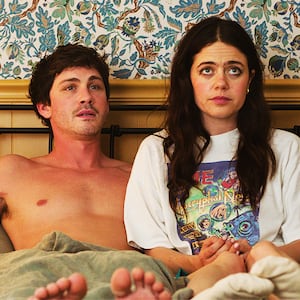The Purge movies may have been all over the place, but their premise—a crime-ridden America gives citizens one night each year to indulge their most violent appetites—was memorably deranged and ripe for lacerating social commentary.
No such grand idea fuels The Home, director James DeMonaco’s latest horror film, in theaters July 25, whose story is a routine assortment of menacing nursing facilities, uncanny old people, twisted nightmares, and dark conspiracies carried out behind locked doors and in dingy basements. Unoriginal, unscary, and led by a largely unconvincing performance by Pete Davidson, it’s the epitome of a knock-off B-movie—and one that’s only mildly entertaining when it shows its cards and goes full-on gonzo.
Max (Davidson) awakens in what appears to be a drug den, lights a cigarette in front of graffiti which reads “Rise or Die,” and remembers happier times celebrating his foster brother Luke (Matthew Miniero) departing for college. “Thicker Than Blood” reads the tattoo across Max’s clavicle, a tribute to his sibling bond, and he responds to these morose thoughts—which involve Luke’s ensuing, tragic suicide—by painting a mural on a city building.
This gets him in trouble with the police, and in order to avoid jail, Max’s foster dad Couper (Victor Williams) pulls some strings with a judge to net him a community-service job at Green Meadows Retirement Home, where he’s to toil as the super. Max doesn’t want this but he prefers it to prison. During his briefing by unfriendly nurses Les (Adam Cantor) and Juno (Mugga), he’s told that he’s not allowed on the fourth floor and that his key doesn’t grant him access to certain basement hallways—red flags which indicate that those areas are the epicenters of the establishment’s madness.
It takes all of two seconds for Max to start encountering creepiness, first in a closet where he (but not the audience) is jolted by a scientific anatomy model, and then when, during his rounds collecting garbage, he enters a room to discover a woman in a The Strangers-style mask breathing heavily while riding a male lover.
It’s quite an introduction to Green Meadows, although Max receives a friendlier welcome from residents Norma (Mary Beth Peil) and Lou (John Glover), the latter of whom surprises him with a party. Dr. Sapien (Bruce Altman) is similarly cheery, yet his wannabe-offhand remark about Max’s large, beautiful eyes is another giant flashing hint regarding the terrors to come. Max, however, is initially less concerned with these individuals than with the traumatic dreams which plague his sleep and the unnerving screams emanating from the ceiling vents.
DeMonaco shoots The Home in evocative widescreen that’s far too professional for the material at hand, and his ominous compositions prop up a tale shuffling predictably toward macabre revelations. Goblets are a recurring sight that speak to Green Meadows’ central mystery, and DeMonaco and Adam Cantor’s script drops additional breadcrumbs which pay off during their wackadoo finale.
Still, these clues barely rise to the level of interesting, much less intriguing, and the same goes for what Max finds upon surreptitiously picking a lock and accessing the fourth floor: a room full of on-death’s-door men and women in grim physical shape (moldy nails, stringy hair, bloody eyes, and drool hanging from their lips) who sit in wheelchairs, hooked up to IVs, as a TV program drones on about oil drilling.
With a mostly shaved head and wearing a collection of t-shirts and hoodies that make it seem like he just woke up after an all-night bender, Davidson’s Max is a shlumpy protagonist, and the actor’s performance is competent so long as he’s asked to merely look grouchy or act sociably toward the few senior citizens (Norma, Lou) his character tolerates.
Davidson stumbles badly, however, in a few late scenes that require him to react to horrors with urgency; his response to a big bombshell, for example, is muted to the point of being unintentionally funny. While he handles his duties during an Oldboy-ish splatterhouse climax with relative aplomb, his subdued turn is a wet match for a film in dire need of a spark.
Before long, Norma is arguing with staffers and subsequently taking a plunge out her window onto a spiky fence, Lou is pulling out his teeth with pliers and handing them to Max, and a weird dude from the fourth floor is biting his finger so he can scrawl unintelligible things in blood on his window.
Glimpses of eyeballs in A Clockwork Orange clamps, skinless fiends, blacklight messages written on Max’s bedroom wall (“Find the Marked Ones”), and security guards with dogs further round out The Home’s unsettling visions, none of which breed suspense.
Neither does the film’s inanest plot development: Max investigating Dr. Sapien online and choosing to recklessly click on spam pop-ups that provide him with an email link to a live web cam of a dungeon that’s home to a prisoner (her identity hidden by a ghoulish facial filter) who dispenses warnings and advice.
The Home is only-in-the-movies silly and yet DeMonaco has an ultimate explanation for his avalanche of illogicalities, which peak with talk about government wrongdoing that feels like leftovers from The Purge.
Unfortunately, casting everything in a different light doesn’t make it look much better, and the writer/director’s closing surprises are preposterous and simply lead to carnage which wraps things up in a neat, tidy, crimson-colored bow. Still, at least an overabundance of goofiness gives the film a personality it had otherwise lacked, and Davidson proves more comfortable participating in silent and deadly action than he does interacting with his elder co-stars.
The Home is a step down from DeMonaco’s signature franchise, less because of execution than because of imagination; there’s nothing here that isn’t a variation on a horror cliché. Whereas The Purge amalgamated with savage and enraged purpose, this snoozer never electrifies its stock elements in a genuinely disquieting manner. Generous genre aficionados might be apt to forgive its trespasses because of its late lunacy, but even they’ll find it hard to ignore the general turgidness of this thriller about the ugliness, misery, and desperation of old age.









